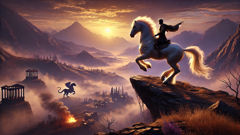Introduction
In the ancient world, where the Aegean kissed Anatolia’s rugged coast and olive trees whispered secrets to the wind, the land of Lycia thrived—a mosaic of sun-bleached hills, tangled forests, and limestone peaks that rose like the bones of slumbering gods. Here, legends were woven into every stone and shadow, and none so chilling or wondrous as the tale of the Chimera. This was no ordinary monster but a nightmare conjured from the fevered imagination of the gods themselves: a beast with the body and mane of a lion, a serpent for a tail, and a goat’s head erupting from its back, spewing fire so fierce it scorched the earth. Villages lay in ruin, fields blackened and barren, as the Chimera’s roar echoed through the valleys, and hope seemed as distant as the stars.
Yet even in those darkest hours, whispers spread of a hero fated to face the monster. Bellerophon—exiled prince, wronged and wandering—arrived at the court of King Iobates, seeking redemption but handed a death sentence. For the king, fearing a guest he could not kill outright, devised an impossible quest: to slay the Chimera and deliver Lycia from its torment. To most, this was a sentence, not a challenge. But Bellerophon carried within him the embers of destiny and an unyielding heart.
In the days that followed, the land watched as Bellerophon sought the favor of the gods atop Mount Olympus, and as stories claimed, Athena herself granted him a bridle of gold to tame the untamable: Pegasus, the winged horse sprung from the blood of Medusa. Astride Pegasus, Bellerophon soared above Lycia’s burning fields, preparing to face the Chimera not with brute force alone, but with daring, faith, and wit. The legend that unfolds is not only the story of a monster’s defeat but of a hero’s journey into the unknown, the transformative power of courage, and the enduring echoes of myth that still shape the lands where east meets west.
The Curse of Lycia: Shadows and Flames
Lycia’s beauty, once legendary, became a land marked by fear. Once, wildflowers blanketed the meadows and bees danced around thickets of thyme and sage. But when the Chimera came, the meadows shriveled, olive trees became brittle skeletons, and farmers abandoned their fields, fleeing to the shelter of crumbling acropolises. The creature’s rampages were unpredictable—a streak of flame on the horizon, a roar that cracked the silence of night. Mothers whispered prayers to Artemis and Apollo, hoping the gods would hear, as flocks vanished and the riverbeds ran dry from scorched rain.

King Iobates, ruler of this beleaguered land, found himself besieged not just by the monster, but by the people’s despair. In his palace above the city of Xanthos, he gathered his wisest counselors and priests, but none dared approach the Chimera. The king’s own family trembled at night, haunted by dreams of burning villages and the beast’s three heads turning their gaze upon Lycia’s last strongholds. It was in this time of terror that Bellerophon arrived, weary from exile and tainted by a crime he did not commit. Sent to Lycia with a sealed message by King Proetus of Argos—who secretly wished him dead—Iobates read the letter in his private chambers and paled. It demanded Bellerophon’s execution, yet Iobates, bound by the ancient laws of hospitality, could not spill the blood of a guest. Instead, he devised a trial he believed would ensure Bellerophon’s doom: to slay the Chimera.
Bellerophon’s first glimpse of Lycia’s devastation left him silent. The roads were littered with blackened bones, villages reduced to smoldering ruins. Yet in the faces of those he passed—children peeking from behind battered doors, old men tending what little crops survived—he saw not just fear but a desperate spark of hope. Guided by an aged shepherd who had lost his flock to the monster, Bellerophon journeyed toward the base of Mount Chimera, where the ground still pulsed with unnatural heat. He camped beneath olive trees and listened to the distant rumble of the beast as it prowled under a sky smeared red by its fires. Each night, his dreams were haunted by the image of the Chimera: its lion’s jaws dripping flame, its serpent tail writhing, its goat’s head shrieking in madness. He knew no mortal weapon would defeat such a thing.
One night, as moonlight spilled across the hills, Bellerophon climbed alone to a sacred grove dedicated to Athena. There, beneath the gaze of stone idols, he knelt and pleaded for guidance. As dawn crept across the sky, he dreamed that Athena appeared before him, her eyes clear as the Aegean, offering a golden bridle. “With this,” she said, “you may tame what none have tamed. Seek the winged horse born of the gods—Pegasus. Only thus may you face fire with flight.”
Awakening with resolve, Bellerophon carried the vision with him. He wandered to the springs of Pirene, where legend whispered that Pegasus drank. For three days, he waited in silence, watching the sun glitter on the water. On the third day, Pegasus appeared, his coat white as moonlit foam, wings arching with celestial strength. Bellerophon approached slowly, speaking words of gratitude to Athena, and slipped the golden bridle over Pegasus’s head. The horse’s wild eyes softened, and in that moment, man and myth became one. Together, they soared into the sky, casting shadows across Lycia’s ravaged earth, ready to confront the terror that haunted the land.
Pegasus and the Ascent: Flight into Legend
When Bellerophon took to the skies on Pegasus, the world below seemed both wondrous and wounded. The horse’s wings beat with thunderous grace, lifting them above olive groves, rivers, and the labyrinth of ruined villages. From this height, Bellerophon saw the scars carved by the Chimera—the charred skeletons of homes, blackened orchards, and the snaking trails of fire where the beast had prowled. Yet in the pale light of dawn, Lycia’s beauty shimmered through the devastation: terraced hills glowed gold, wildflowers clung stubbornly to cliffs, and storks wheeled over silver streams.

Pegasus was no ordinary steed. Born from the blood of Medusa, sired by Poseidon, he embodied both the terror and majesty of the gods. His wings shimmered with an iridescent sheen; his mane streamed like comet tails in the wind. With every rise and fall, Bellerophon felt the divide between mortal and divine narrow, as if he too might one day stride among Olympus’ halls. But the Chimera was never far from his thoughts.
On their first approach to Mount Chimera, Bellerophon spied the monster crouched atop a rocky crag, flames licking from its jaws. The lion’s head snarled, its golden eyes burning with malice. The goat’s head bleated curses in a voice like tearing metal, while the serpent tail lashed, hissing poison into the earth. Bellerophon circled above, seeking weakness, but every attempt to approach was met with a barrage of fire so fierce it seared the feathers from Pegasus’s wings.
He retreated to regroup, haunted by his narrow escape. At night, he conferred with priests and wise women who told him of prophecies and old magics. One elder recalled an ancient riddle: "Fire devours all—save that which devours fire." Inspired, Bellerophon crafted a plan. He fashioned a spear with a block of lead at its tip, recalling that when fire met lead, it would melt and flow like a river. His hope was to drive the lead into the Chimera’s gullet, let its flames melt the metal, and end the beast from within.
The final ascent was harrowing. As Pegasus rose above Mount Chimera in a swirl of dawn mist, Bellerophon steeled his resolve. The Chimera roared—a sound that shook the sky—and unleashed a torrent of fire. Pegasus wheeled and dove, darting between plumes of flame. The lion’s claws snapped inches from Bellerophon’s leg; the serpent tail spat venom that hissed through the air. In a moment of perfect timing, as Pegasus soared past the monster’s open jaws, Bellerophon hurled his spear deep into the Chimera’s throat. The lead melted in a flood of silver fire. The monster convulsed, its three heads writhing in agony, and with a final, shuddering roar that echoed through the mountains, the Chimera collapsed. Its fires guttered and died, leaving only smoke and silence.
Aftermath: The Hero’s Shadow and Lycia’s Dawn
The death of the Chimera brought silence that rang through Lycia like a bell. For days, the valleys echoed with nothing but birdsong and the tentative voices of villagers emerging from their ruined homes. Fields that had been blackened began to breathe again; new shoots pressed through ashen soil, and rivers ran clear where once they steamed with unnatural heat. The land itself seemed to awaken from a nightmare, stretching beneath the pale sun.

Bellerophon returned to Xanthos atop Pegasus, greeted by throngs who wept with joy and disbelief. King Iobates, astonished that his impossible challenge had been overcome, welcomed Bellerophon with feasts and gifts. The king’s daughter, Philonoe, gazed upon the hero with awe and admiration, and in time she became his beloved. The people of Lycia celebrated with festivals that lasted for days, sacrificing at temples and planting new groves to honor Athena and Poseidon. Bellerophon’s name echoed in every corner—from shepherds on lonely hills to artisans in bustling markets—his courage and ingenuity immortalized in song and story.
But even as Lycia flourished, a shadow followed Bellerophon. His triumph bred pride, and whispers grew that he might challenge even the gods. Some say he attempted to ride Pegasus to Olympus itself, seeking to join the immortals. Zeus, angered by mortal hubris, sent a gadfly to sting Pegasus. The winged horse reared, and Bellerophon fell to earth, crippled but alive. He wandered alone for years after—revered but haunted, forever marked by his ascent and fall.
The Chimera’s bones were said to have lain for generations atop Mount Chimera, where flames still flicker from hidden vents—a reminder of the beast’s legend. Shepherds pointed to the smoldering rocks and told their children of Bellerophon and Pegasus, of the courage that changed their land and the dangers of pride unchecked. In time, Lycia became a place of pilgrimage; heroes and dreamers traveled from distant lands to stand where myth had met reality. Temples were raised to Athena, statues carved in marble and bronze, and the image of Pegasus adorned shields and coins.
Generations passed, but the story endured. Each spring, when the meadows bloomed once more and the mountains glowed purple at sunset, Lycians gathered to recount the tale of the Chimera’s defeat. They spoke not only of monsters and gods but of the frailty and strength within every human heart. For in facing terror and rising above it—even if only for a moment—Bellerophon had changed Lycia forever. The land remembered, as did its people: that even in darkness, courage could give rise to hope, and that hope could become legend.
Conclusion
Long after Bellerophon’s name faded from the lips of kings and conquerors, his legend lived on in Lycia’s hills and valleys. The tale of a hero and his winged companion who soared above fear and flame continues to inspire those who find themselves facing their own impossible odds. The Chimera—once a terror that blighted the land—became a symbol of every challenge that seemed insurmountable, every darkness waiting to be met with courage and wit. Even now, in the lands where Anatolia meets the sea, the winds whisper stories of Bellerophon and Pegasus, reminding us that heroism isn’t just for those touched by gods but for anyone who dares to rise when others despair. The fires of the Chimera may still flicker in the rocks of ancient Lycia, but it is hope—and the memory of a hero astride a winged horse—that truly endures.













